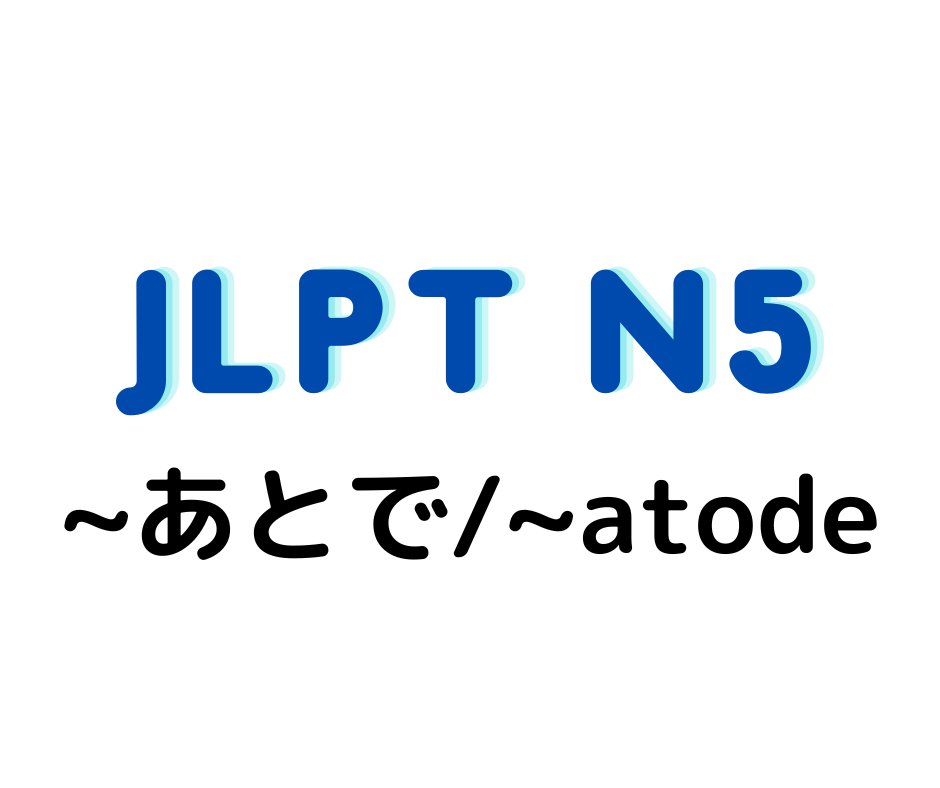Sentence pattern: 〜あとで / ~atode
【Grammar Type】
Conjunction
【Essential Meaning】
After X
【Construction】
Verb informal past + あとで
E.g. 話したあとで
hanasita atode[After X spoke]
E.g. 食べたあとで
tabeta atode[After X ate]
Noun + の + あとで
E.g. コンサートのあとで
konsa-to no atode [After the concert]
NOTE
- あとで (atode / 後で) is a conjunction that simply expresses that one action takes place after another action has taken place (i.e. “After X occurs, Y occurs“). あとで(atode) does not necessarily imply that one event immediately follows the other. It simply implies that one event precedes the other temporally.
- In casual speech, で may drop after あと(ato).
- E.g. ご飯を食べたあとすぐ勉強した。
- gohan wo tabeta ato sugu benkyou sita. [Immediately after I ate, I studied.]
- E.g. ご飯を食べたあとすぐ勉強した。
- Be careful not to confuse あとで with てから(tekara). The key differences are:
- (1) てから(tekara) implies the span of time immediately following some action, while あとで(atode) implies any span of time following some action (i.e. it doesn’t imply immediacy).
- E.g. 日本へ来てからになりますか。
- nihon e kitekara nannen ni narimasuka. [How many years have passed since you came to Japan?].
- In this case, the relevant time span is the period beginning immediately after the hearer’s arrival in Japan. Thus, てから(tekara) is appropriate and あとで(atode) is not.
- E.g. 日本へ来てからになりますか。
- (2) With てから(tekara), the main predicate generally expresses an action under the subject’s immediate control. あとで(atode) does not have such a restriction.
- E.g. 私がうちへ帰ったあとで雨が降った。
- watasi ga uchi e kaetta atode amega futta. [After I got home, it rained.].
- In this case, てから(tekara) would be unacceptable because the rain is not under the subject’s control.
- E.g. 私がうちへ帰ったあとで雨が降った。
- (1) てから(tekara) implies the span of time immediately following some action, while あとで(atode) implies any span of time following some action (i.e. it doesn’t imply immediacy).
- あとで(atode) can be interchanged with ~たら(tara) when ~たら(tara) conveys a purely temporal meaning.
- E.g. ご飯を食べたらすぐ勉強しました。
- gohan wo tabetara sugu benkyou simasita. [Immediately after I ate, I studied.]
- E.g. *日本へ行ったらどうですか。
- nihon e ittara doudesuka. [How would you like to go to Japan?]
- In this case, ~たら(tara) is used with the idiomatic expression ~たらどうですか(taradoudesuka) rather than in a purely temporal sense. So in this case, ~たら(tara) and あとで(atode) are not interchangeable.
- E.g. ご飯を食べたらすぐ勉強しました。
Example sentences
verb sentence
- 図書館で宿題をしたあとで、帰ります。
- Tosyokan de syukudai wo shitaatode kaerimasu.
- After doing my homework at the library, I will go home.
- 今から少し練習したあとで、前で発表してもらいます。
- imakara sukoshi rensyuu sita atode , maede happyou shite moraimasu.
- After you have practiced a little, I will ask you to make a presentation in front of the class.
- 電車に乗ったあとで、学校に忘れ物をしたことに気がつきました。
- densyani notta atode, gakkouni wasuremonowo shitakotoni kigatukimasita.
- After getting on the train, I realized that I forgot something at school.
- アニメを見たあとで、お風呂に入ります。
- animewo mita atode ofuroni hairimasu.
- After watching anime, I’m going to take a bath.
- スマホで写真を撮ったあとで、少し色を変えたり、サイズを変えたりします。
- sumahode syasinwo totta atode , sukosi irowo kaetari, saizuwo kaetari simasu.
- After taking a picture with my phone, I change the color and the size a little.
noun sentence
授業のあとで、カラオケ行かない?
jugyouno atode karaoke ikanai?
Do you want to go to karaoke after class?
ご飯のあとで、シャワーを浴びます。
gohanno atode syawaa wo abimasu
I’ll shower after dinner.
仕事のあとで、飲みに行きませんか。
sigotono atode, nomini ikimasen ka.
Let’s go for a drink after work.
映画のあとで、ちょっとカフェでもどう?
eigano atode, chotto kafedemo dou?
After the movie, do you want to go to a cafe?
飲み会のあとで、同僚とラーメン屋に行った。
nomikaino atode, douryou to raamenyani itta.
I went to a ramen shop with my colleagues after a drinking party.


コメント